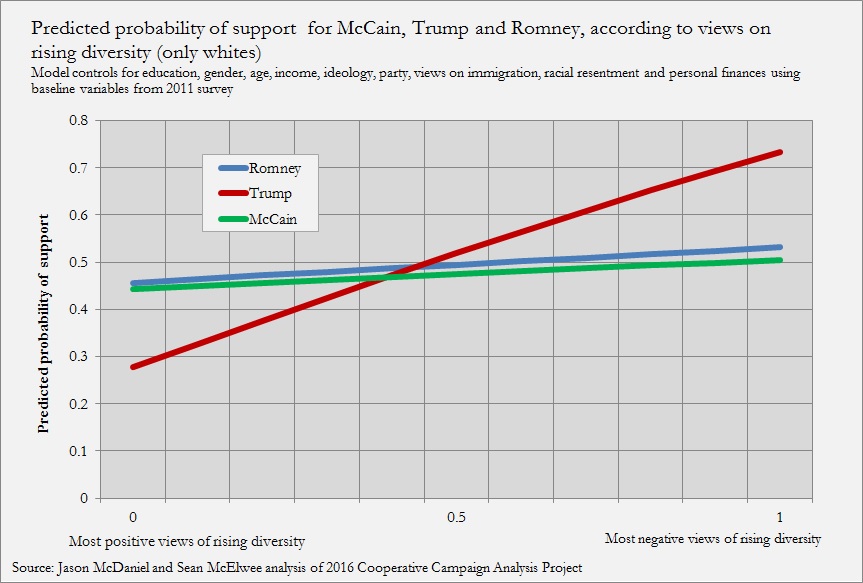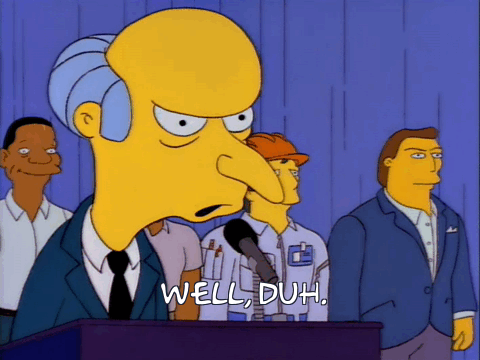since people were curious about my hot take on this article...
I pretty much agree with the article (racist attitudes predict level of support for Trump, no disagreement from me!). My position isn't that "uhhhh, medicare for all will automatically win over every Trump voter and cause them to not be racist anymore", so it doesn't really contradict things I've mentioned elsewhere. There are more people than just Trump (and Clinton) voters, after all (and a lot of them also live in red states). Though of course, if supporting Medicare for all (and obviously, not compromising on other views) peels off a couple Trump voters, then if I'm a candidate, I wouldn't complain, since that's a policy that obviously benefits everyone, and more votes helps me put that policy into action.
(edit: since I may have misspoke before, it's probably more accurate to say my position is "more leftist policies may help keep people like Trump from taking so much power", rather than "more leftist policies will make Trump voters no longer vote for Trump")
In reference to the WV thread that sort of ties in with this one,
voter turnout in that specific county where the the town hall was held was
36.24%.
So when I look at that townhall and saw the moment with the guy who says "all citizens should have access to health care", I think "hmm, there's probably a base to work from long-term in that area, someone should organize there", while others apparently see the "75% of voters voted for Trump" and immediately write it off and assume everyone there (including the 25% of people who didn't vote for Trump, and the 64% of people who didn't vote at all) is head over heels in love with Trump and racism.
(Which I think speaks to our general erasure of non-voters in this country, of all backgrounds)
And I feel like people shouldn't fall into the trap of "poor rural white people, probably racist Trump voters", since it was often
wealthier white people that had racist attitudes and supported Trump. So that's another major point of difference from the WV thread and why this isn't necessarily a rebuttal to that one. Now, I guess you can then make the argument that not voting for Clinton to stop Trump
also makes you racist, or sympathetic to racists, and therefore immune to any sort of strong social/economic justice platform, but that seems like more of a stretch...
Also, the article says:
Additional analysis reveals differences between white Republican and Democratic identifiers who switched from Obama to Trump. Seeing diversity as a threat had a particularly strong effect on white Republican identifiers who switched from Obama to Trump, but a comparatively modest effect on white Democratic switchers. Similarly, racial resentment towards blacks had a stronger impact on the probability of Obama-to-Trump vote switching for white Republicans compared to white Democrats.
So in the context of the 2016 election, this effect applied more to white Republican switchers than white Democratic switchers. Still bad for them to switch, of course, and still racist! But it shows that other factors (party ID) do play a role in how strongly someone's attitudes towards diversity will influence their vote.
And if they identified as Democratic beforehand, that probably means they were relatively open to "economic populism" at some point in time. Again, it doesn't suddenly make them not racist, and it still isn't "good", and maybe they can't ever be won over again (which is why I talk more about non-voters) but if racism was the
only factor affecting them, then party ID wouldn't have played a role in lessening that impact.
Also from the article
 Increasingly, class is simply not a meaningful dimension along which American politics is fought
Which I also agree with! Especially within the context of the 2016 election. So that leaves American politics to be fought on other terms...like racism and demagoguery and emails and walls.
 In the 2016 election, the traditional Democratic advantage among low-income people was deeply diminished. Corporations, long seen as the enemy for progressives, are increasingly seen as allies on issues like immigration and LGBT rights. Unions, once the backbone of the Democratic Party, have waned in influence, and many found their members receptive to Trump's message.
So then I wonder: did unions wane in influence because everyone is vastly more racist in 2016 than they were in the 70's because of Trump, or was this because of specific political actions by both the Democratic and Republican parties to diminish their influence, which then contributed to class not being a meaningful dimension along which American politics is fought, and then leads to...well, now?
Also I've followed one of the authors of this article, Sean McElwee, on Twitter for a while, and he routinely tweets about seizing the means of production, so I hope people don't take this article as an argument against "Democrats should be much more progressive on class"
in general, since
that wasn't his intent, and he's
routinely argued the opposite before. It just means that for the particular set of
Trump voters in
2016, economic populism wouldn't have done a lot to convince them otherwise.


